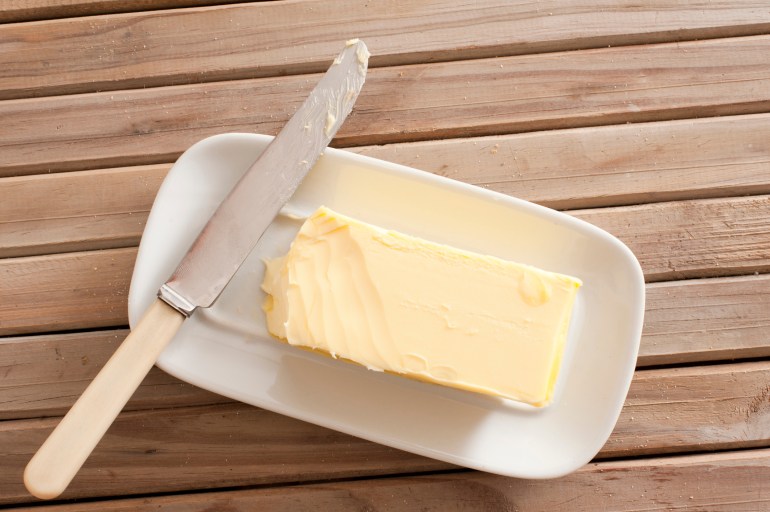Despite the delicious taste of butter, especially when used on a toast with some jam or honey, or added to popcorn to give it a better taste;
Many prefer to avoid this natural substance and use margarine, especially for those who want to lose weight or have problems with cholesterol level, but is this true?
Those who refuse to eat butter are based on the principle that it is the main cause of weight gain, so what is the correctness of this statement?
Is margarine - which some call the butter itself - which is made of hydrogenated vegetable oils better for our health?
Although margarine contains more unsaturated fatty acids than butter, this does not make it better, according to the German Focus magazine;
The biggest health risk that butter poses is that it contains a large amount of calories.
But this also applies to all other fats, explains Maria Pfeiffer, a nutritional physiologist at the Institute of Nutritional Physiology and Biochemistry at the Max Rubiner Institute (MRI).
However, according to the German expert, studies that compared butter and other fats showed that the calorie content is almost the same with margarine and margarine, both of which contain about 80% fat and 20% water.
And 100 grams of butter contains 741 calories, in contrast, 100 grams of ghee contains a little less, that is, 709 calories.
While butter is made from buttermilk, modern margarine is made primarily from refined vegetable oil and water.
The nutritionist explains that opting for semi-fat butter is not a solution either.
The best alternative is to choose butter or low-fat fat, as it contains approximately 380 calories.
Butter tastes better when eaten with jam on toast (Getty Images)
cholesterol levels
Not all fats are equal in cholesterol levels - according to the German magazine - there is a difference in the number of fatty acids, and whether they are saturated, monounsaturated or polyunsaturated.
In order to make a better choice with regard to cholesterol, the nutritionist shows the following basic rule: the more fat holds together through the coldness of the regular refrigerator, the higher the percentage of saturated fatty acids in it.
Butter is mainly composed of saturated fatty acids, and it is also made up of good fats and bad fats for the body, so experts have long debated whether or not butter is useful.
According to studies, butter is composed mostly of about 70% of saturated fatty acids, about 26% of monounsaturated fatty acids, and from 2 to 5% as a maximum of polyunsaturated fatty acids.
On the other hand, margarine contains about 25% of saturated fatty acids, about 48% of monounsaturated fatty acids, and about 25% of polyunsaturated fatty acids.
Therefore, butter can increase cholesterol levels because it contains more saturated fat than margarine.
“However, about a third of the saturated fatty acids in butter have a special structure that does not significantly affect the level of cholesterol in the blood,” Pfeiffer explains.
Although the warning about the dangers of butter is just a myth, the important thing is that the amount consumed should not be large (Getty Images)
Dangerous trans fats
In the past, in order to form a spreadable mass of liquid vegetable oil, the oils were chemically hardened, and during this process the so-called unsaturated fatty acids were formed, which are especially harmful to health;
It increases the level of bad cholesterol (LDL) and reduces the level of good cholesterol.
Today, margarine is still known to contain harmful trans fats, but it is now manufactured using other, less harmful processes.
Do I eat butter a lot?
Despite the statement that the warning of the danger of butter is just a myth, it is important that the amount consumed should not be large, and butter or margarine and margarine should be used carefully, for fear of the accumulation of excess fat in the body.
Unlike other fat cells in the body, stomach fat cells are metabolically active;
Its presence promotes diseases such as diabetes and cardiovascular problems.

